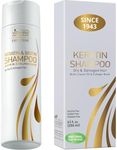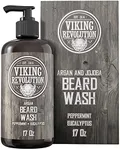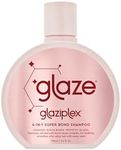Buying Guide for the Best Shampoos For Oily Hair
Choosing the right shampoo for oily hair can make a significant difference in managing excess oil and maintaining a healthy scalp. Oily hair is often the result of overactive sebaceous glands, which produce more sebum than necessary. The right shampoo can help balance oil production, cleanse effectively without stripping natural oils, and leave your hair feeling fresh and clean. When selecting a shampoo, consider your hair type, scalp condition, and any specific concerns you may have, such as dandruff or sensitivity. Understanding the key specifications of shampoos for oily hair will help you make an informed decision.Cleansing AgentsCleansing agents, or surfactants, are the ingredients in shampoo that help remove dirt, oil, and product buildup from your hair and scalp. For oily hair, it's important to choose a shampoo with effective cleansing agents that can cut through excess oil without being too harsh. Look for shampoos with ingredients like sulfates, which are strong cleansers, or milder alternatives like sulfonates or glucosides if you have a sensitive scalp. If your hair gets oily quickly, a stronger cleansing agent might be necessary, but if your scalp is sensitive, opt for a milder formula.
pH BalanceThe pH level of a shampoo can affect how it interacts with your hair and scalp. A pH-balanced shampoo, typically around 4.5 to 5.5, is ideal for maintaining the natural acidity of your scalp, which can help control oil production and prevent irritation. Shampoos with a higher pH can be more drying and may strip too much oil, leading to overproduction of sebum as your scalp tries to compensate. If you have oily hair, look for a pH-balanced shampoo to help maintain a healthy scalp environment.
Oil-Absorbing IngredientsSome shampoos for oily hair contain ingredients specifically designed to absorb excess oil. These can include natural clays, charcoal, or certain starches. These ingredients help to soak up oil from the scalp and hair, leaving it feeling cleaner for longer. If your hair tends to get greasy quickly, a shampoo with oil-absorbing ingredients can be beneficial. However, if your hair is only slightly oily, you might not need these additional ingredients.
Moisturizing IngredientsWhile it might seem counterintuitive, even oily hair needs some level of moisture to stay healthy. Shampoos with moisturizing ingredients like aloe vera, glycerin, or panthenol can help maintain the right moisture balance without adding extra oil. If your hair feels dry at the ends but oily at the roots, a shampoo with light moisturizing properties can help balance these needs. However, if your hair is uniformly oily, you might want to avoid shampoos with heavy moisturizers.
Fragrance and AdditivesFragrance and other additives in shampoos can enhance the sensory experience of washing your hair, but they can also cause irritation for some people. If you have a sensitive scalp or are prone to allergies, look for shampoos that are fragrance-free or have natural fragrances. Additionally, avoid shampoos with unnecessary additives like silicones, which can weigh down oily hair and make it look greasy faster. Choose a shampoo that aligns with your sensitivity levels and personal preferences.



















